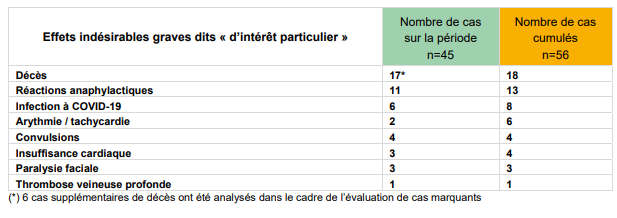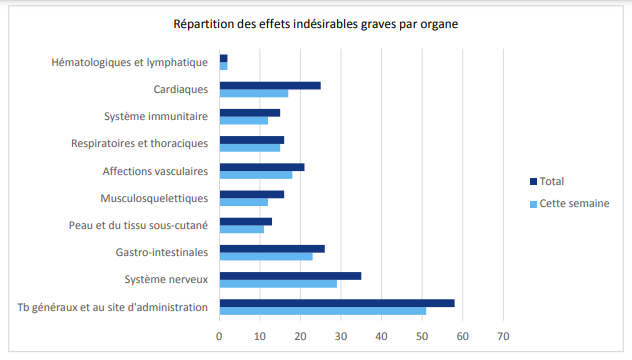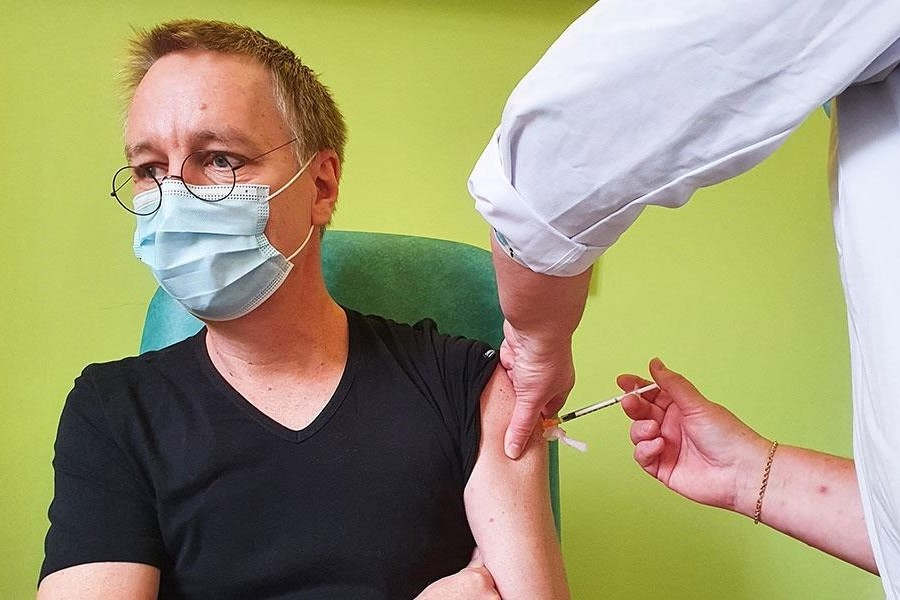Vitamin D should prevent the potential deleterious “Covid-19-like” effects sometimes observed following vaccination according to Jean-Marc Sabatier, researcher at the CNRS. Explanations.

Jean-Marc Sabatier is Director of Research at the CNRS and Doctor in Cell Biology and Microbiology, affiliated to the Institute of Neuro-Physiopathology (INP) of Marseille. Editor-in-Chief of the international scientific journals “Coronaviruses” and “Infectious Disorders – Drug Targets”.
Jean-Michel Wendling- What about vaccination and side effects?
Jean-Marc Sabatier– As of January 28, 2021, 1,349,000 people have been partially vaccinated (+117,217 in 24 hours). To vaccinate the entire adult population (52 million people) by August 2021, 471,172 doses would have to be injected daily. At the current rate (average of the last 7 days), the goal of vaccinating the entire adult population would be reached on October 27, 2024!
Side effects of vaccination remain rare but are increasing over the last week for which results are available: 574,409 people were vaccinated from 16/01/2021 to 22/01/2021. According to the National Agency for Medicines, 524 cases of post-vaccination Pfizer/BioNTech adverse events, 21% of which were serious, were recorded during the week of January 16-22. 56 cumulative serious events were recorded (table).
23 deaths (17+6) were reported, but the ANSM specifies that “these were elderly people living in EHPAD or in old-age homes, most of whom presented severe co-morbidities. A few people were followed in a palliative care service”. “In view of the current data, there is nothing to conclude that they are related to vaccination,” adds the Agency and the Minister of Health.

Table from the weekly case report on adverse events for the COVID19 ANSM vaccine
It can also be seen that the number of side effects in proportion to the number of doses tends to increase very significantly (graph).

J.-M. W. How can these effects be explained and are they avoidable?
J.-M. S. The ongoing and large-scale vaccination against CoV-2-SARS has highlighted the appearance of potential adverse effects resembling Covid-19 in some more sensitive and/or fragile individuals. There is evidence that vitamin D deficiency in these individuals may promote potentially serious side effects. The vaccine could cause overactivation of the renin-angiotensin system (RAS) leading to Covid-19-like symptoms that could be consistent with the events described by the ANSM. (Graph 2)

Graph from the weekly case report on adverse events for the COVID19 ANSM vaccine.
Thus, it appears that pre-vaccination vitamin D supplementation of deficient individuals is of primary importance as it should prevent the onset of complications, while allowing for more effective vaccination. Indeed, vitamin D allows the immune system to function optimally.
As described in a previous article (frenchDailyNews, December 21, 2020), the risks associated with vaccination, although rare, are a possible trigger of “deleterious” responses following an interaction of the vaccine protein with one (or more) receptor site(s).
The second risk is to induce an inappropriate immune response against the vaccinated person. The immune system then mobilizes itself against one or more proteins of the self resulting in the potential triggering of autoimmune diseases.
The existence of a non-negligible number of individuals presenting more or less severe “Covid-19-like” symptoms and/or pathologies following their vaccination strongly suggests that the S protein (trimer of the glycosylated S protein) produced from the vaccine messenger RNA could act on its cellular target ACE2 (angiotensin converting enzyme 2), and trigger an overactivation of the RAS (1-3). This would lead to an excess of angiotensin-2 on the deleterious AT1R receptor and the onset of symptoms and/or pathologies of Covid-19 (1-4).
J.-M. W. – How then to prevent these rare but potentially dangerous side effects?
J.-M. S.- In order to prevent the appearance of potential deleterious “Covid-19-like” effects during vaccination, it would be useful to proceed to vitamin D supplementation (cholecalciferol or vitamin D3), especially in case of deficiency or insufficiency (plasma level < 10-20 ng/ml). Indeed, vitamin D supplementation should achieve a satisfactory plasma vitamin D level (50 ng/ml or even 75 ng/ml).
Vitamin D, as an inhibitor of RAS (1), thus counters the deleterious effect of overactivated RAS and may prevent a progression to more severe or even fatal (4-6) forms of post-vaccination “Covid-19-like”. Since most of the population is deficient in vitamin D, it is essential to achieve a satisfactory pre-vaccination vitamin D status through cholecalciferol supplementation.
In summary, an appropriate vitamin D blood level of around 50 ng/ml should allow for optimal functioning of the immune system (“innate” and “adaptive”) necessary for proper vaccination, and prevention of potential “Covid-19-like” symptoms and pathologies that may occur following vaccination.
It is important to remember that the benefit/risk ratio of vaccination against SARS-CoV-2 remains very favorable and is therefore recommended, particularly in people who are “at risk” (elderly or dark-skinned people and/or those with co-morbidities: diabetes, obesity, hypertension, cancer, etc.).
To know more about it
- SARS-CoV-2
During viral infection, CoV-2-CoV-SARS overactivates the renin-angiotensin system (RAS) by binding to the ACE2 receptor, which has an angiotensin-2-degrading function (1-3). Binding of CoV-2-SARS to the ACE2 receptor thus prevents the normal degradation of angiotensin-2, an excess of which leads to overactivation of its cellular AT1R receptor. The overactivated AT1R receptor is highly deleterious to the human body (induction of cytokine storm, vasoconstriction, inflammation, fibrosis, oxidative stress, tissue hypertrophy, decrease in nitric oxide NO linked to immunity and memory processes, etc.) and appears to be responsible for the evolution towards severe, sometimes fatal, forms of Covid-19. This deleterious effect of AT1R on the human body results in the appearance of various pathologies similar to those described for an SARS-CoV-2 infection.
- The Renin-Angiotensin System (RAS)
RAS is a hormonal/physiological system of primary importance, present in the lungs, kidneys, intestines, heart, brain, testes, blood vessels, as well as “innate” immunity cells (circulating monocytes, macrophages, dendritic/antigen presenting cells, Natural Killer cells, etc.). RAS controls renal, pulmonary and cardiovascular functions, as well as “innate” immunity (which corresponds to the “immediate” non-specific immune response to pathogens) and the intestinal microbiota (1-3).
- Vitamin D
Vitamin D is a seco-steroid pro-hormone that acts on at least 291 genes, hence its involvement in many physiological processes: bone mineralization and calcification, innate immunity (circulating monocytes, macrophages, dendritic cells/antigen presenting cells, Natural Killer (NK) cells, etc.), and the development of a number of other physiological processes. ) and adaptive/acquired immunity (B and T lymphocytes), the proliferation and differentiation of certain cell types (including immune system cells), the maintenance of physical barriers (effect on inter-cellular junctions), as well as the regulation of RAS (1,2). In particular, vitamin D makes it possible to avoid/mitigate the cytokine storm that is very harmful to the human body (excessive release of pro-inflammatory cytokines TNF-alpha, interleukin-6, interleukin-1-beta, interferon-gamma, etc.), which is at the origin of the evolution towards severe forms of Covid-19. In parallel, vitamin D enhances the production of anti-inflammatory cytokines via adaptive/acquired immunity, in order to inhibit acute systemic hyper-inflammation.
Another action of vitamin D on immunity is to directly induce the production of anti-microbial molecules active on viruses (cathelicidin and defensins).
Thus, vitamin D allows the optimal functioning of the immune system necessary for effective vaccination, and induces the production of molecules with antiviral properties that allow the host to prevent or treat a possible infection with CoV-2-SARS and its variants (1,5,6).
Références
- SARS-CoV-2 & COVID-19: Key-roles of the renin-angiotensin system / Vitamin D impacting drug and vaccine developments. Cao, Z., Wu, Y., Faucon, E., Sabatier, J.M., Infectious Disorders-Drug Targets, 20, 348-349 (2020). Doi: 10.2174/1871526520999200505174704
- ACE2 – From the renin-angiotensin system to gut microbiota and malnutrition. Perlot, T., Penninger, J.M., Microbes and Infection, 15, 866-873 (2013).
- Counter-regulatory ‘renin-angiotensin’ system-based candidate drugs to treat COVID-19 diseases in SARS-CoV-2-infected patients. Annweiler, C., Cao, Z., Wu, Y., Faucon, E., Mouhat, S., Kovacic, H., Sabatier, J.M., Infectious Disorders-Drug Targets, 20, 407-408 (2020). Doi: 10.2174/1871526520666200518073329
- Neurological, cognitive and behavioral disorders during Covid-19: the nitric oxide track. Annweiler, C., Bourgeais, A., Faucon, E., Cao, Z., Wu, Y., Sabatier, J.M., Journal of American Geriatrics Society, 10.1111/jgs.166671 (2020). Doi: 10.1111/jgs.166671
- Point of view: Should COVID-19 patients be supplemented with vitamin D? Annweiler, C., Cao, Z., Sabatier, J.M., Maturitas, 140, 24-26 (2020). Doi: https://doi.org/10.1016/j.maturitas.2020.06.003
- Vitamin D and survival in COVID-19 patients. A quasi-experimental study. Annweiler, C., Hanotte, B., de l’Eprevier, C.G., Sabatier, J.M., Lafaie, L., Célarier, T. J. Steroid Biochem. Mol. Biol. 204, 105771 (2020). Doi: 10.1016/j.jsbmb.2020.105771
Interview conducted by Dr. Jean-Michel Wendling, scientific consultant for infodujour and FrenchDailyNews.

